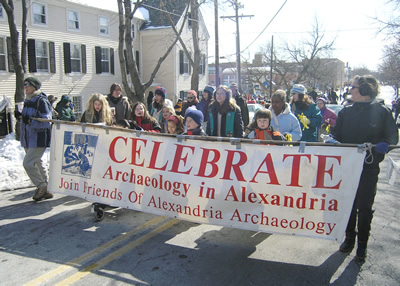
During the 1960s, Washington, DC and its surrounding communities experienced an urban renewal that saw a rebuilding of infrastructure and consequently required the destruction of a number of older buildings in the area. In Alexandria, an independent city a short distance from DC, the destruction of the old buildings uncovered an abundance of historical artifacts that shed light on the history of the area. Realizing that there was a plethora of previously undiscovered, culturally-important artifacts right beneath their feet, the city’s leadership created the Office of Historic Alexandria to try to cultivate and make sense of this new information.
Historians and archaeologists are not the only ones who benefit from learning about the cultural heritage of a town or region. Understanding the roles of people, places, and events that shape a community can promote a sense of connectedness among residents and encourage people to do more to help the community. Policy-makers can benefit as well as more information about past decisions can improve present-day policy choices. In many communities, historic neighborhoods and museums act as a draw for tourists, and surrounding restaurants, stores, and hotels can benefit from the influx of visitors. The city of Alexandria has created one of the more profitable historic neighborhoods in the country through the Office of Historic Alexandria.
The Alexandria Archaeology program is a division of the Office of Historic Alexandria that provides a number of services to the community to help spawn interest in the history of the area. Headquartered in an old Torpedo Factory on the Potomac River, the program consists of a number of professional archaeologists who study the history of the area and help run the Alexandria Archaeology Museum. Working with local volunteers and developers, the program locates sites that are likely to be housing valuable artifacts or information, and excavates the land to find these resources. They also offer historical tours of Alexandria, an after-school program for students and families called Archaeology Adventures Lessons, and support an interactive computer programs that make it easy to explore historical Alexandria from one’s own home.
Alexandria Archaeology is a good example of the potential power that cultivating a city’s cultural heritage can have to transform a community. The establishment of Historical Alexandria, commonly known as ‘Old Town’, has successfully drawn tourists to the area and the houses in the surrounding community have seen their value increase drastically. Understanding the history that present-day Alexandria was built on has benefitted many of the city’s residents and made for a more connected community.
For more information: http://alexandriava.gov/historic/default.aspx